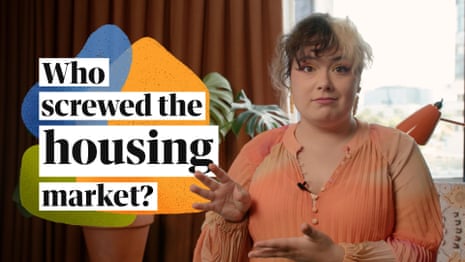Anthony Albanese has repeatedly declined to confirm or deny whether the federal government is considering changes to negative gearing, but conceded that public servants “do a range of proposals” on potential ideas.
The Nine newspapers reported on Wednesday that the government had asked Treasury to model potential changes to negative gearing concessions. The government has come under pressure from the Greens and crossbench to make changes to the property investment tax breaks, amid speculation that Labor could consider making a bold change as part of their re-election bid.
“I’m sure the public service are looking at policy ideas. That’s because we value them. But we have our housing policy. It’s out there for all to see,” Albanese said in Tasmania when asked about the report.
“What our government is considering is fixing housing supply by getting our legislation through the Senate. That’s what we’re considering … I talk about what we’re doing, not what we’re not doing.”
Negative gearing is a tax concession where investors can deduct losses from investment properties – that is, if their expenses are higher than any rent derived from the home – from their other taxable income, reducing their tax bill.
It has become a totemic policy in Australian politics, blamed by critics for raising housing prices but backed by supporters as an important setting for financial investments and rental supply.
Parliamentary Budget Office analysis, commissioned by the Greens, found tax breaks given to investors with more than one property will cost more than $165bn over the next decade. The Greens have been pressuring the government to wind back negative gearing concessions for people with multiple homes as part of its housing package; but following major political attacks on proposed negative gearing changes at the 2019 election, Labor has been reticent to consider such reforms.
Government sources have downplayed the potential for changes but the treasurer, Jim Chalmers, did not categorically rule it being part of future plans.
“Our housing policy is clear. It doesn’t include that change,” a spokesperson for the treasurer said on Wednesday.
“We have a broad and ambitious housing agenda and we could be building more homes if it wasn’t for the divisive politics of the Greens and Coalition.”
Asked to confirm whether the government has asked Treasury for modelling, Albanese responded: “I didn’t confirm that.
“Treasury, I’m sure, like other departments, do a range of proposals, policy ideas. I want a public service that is full of ideas.”
The social services minister, Amanda Rishworth, also did not categorically rule out negative gearing changes when asked about the issue in an interview on Sunrise, saying instead the government was focusing on other housing reforms. Rishworth countered that Treasury does such modelling “all the time around different policies”.
“We have got a very ambitious housing policy … It is not our proposal to address or to add negative gearing to that,” she said.
“Treasury does this sort of work … routine work all the time around different policies, different ideas … they look at a variety of scenarios.”
The shadow finance minister, Jane Hume, appearing opposite Rishworth on Sunrise, claimed curbing negative gearing would have a “dramatic impact” on supply of rental homes.
But asked in a separate interview on ABC TV whether the Coalition would rule out changes to negative gearing at the election, Hume would only say “we’ll rule out anything that reduces housing supply and pushes rents up”.
“I can’t rule out a policy that I haven’t seen.”
The independent MP Allegra Spender and senator David Pocock both welcomed reporting of the potential negative gearing change on social media. Spender tweeted “every tax should be on the table”; Pocock tweeted there were “sensible ways to turn this around”.
Albanese was asked several times in a Radio National interview last week whether the government would consider changes to negative gearing, both in the context of negotiations with the Greens on housing policy, but also more broadly. On each occasion he failed to categorically rule out consideration of changes, but noted concerns from economists about the potential impact on housing supply.
“We’re interested in the tax policy that we are implementing, not the ones that we’re not,” Albanese said. He went on to claim the interviewer was posing “not terribly clever questions”.
“People voted in 2019 on some of those ideas. They were rejected,” Albanese said, referencing Bill Shorten’s unsuccessful election platform.
“What we are interested in, when it comes to housing, is things that will increase supply. Now, there is – a whole lot of economists will tell you that the measures that you talk about will not increase supply and the danger is they will decrease supply. The key to housing affordability is to get more homes.”
The Liberal party has already begun raising concerns with voters and supporters about potential changes to negative gearing. The deputy leader, Sussan Ley, last week put her name to an email to supporters, pointing to Albanese’s Radio National interview and claiming changes to the settings “could affect the financial future of millions of Australians”.
“[The Liberal party] remain committed to protecting negative gearing and maintaining the current capital gains tax concessions,” Ley’s email read.
“We believe in rewarding hard work and smart investments, not penalising them.”






